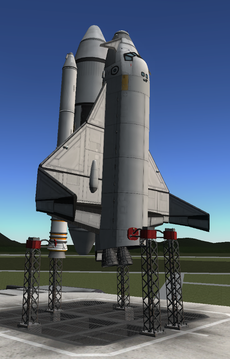Difference between revisions of "Dynawing"
Peteletroll (talk | contribs) (→Description) |
m |
||
| Line 3: | Line 3: | ||
[[File:Dynawing launchpad.png|thumb|upright|Dynawing on the launch pad ([[1.0.5]])]] | [[File:Dynawing launchpad.png|thumb|upright|Dynawing on the launch pad ([[1.0.5]])]] | ||
| − | The '''Dynawing''' is a [[wiki:Space Shuttle|Space Shuttle]]-inspired [[Stock craft|stock]] spacecraft. Like the Space Shuttle, it has a reusable orbiter vehicle, a liquid fuel expendable external tank and two solid fuel boosters. It is one of the three space shuttles included in stock. | + | The '''Dynawing''' is a [[wiki:Space Shuttle|Space Shuttle]]-inspired [[Stock craft|stock]] spacecraft. Like the Space Shuttle, it has a reusable orbiter vehicle, a liquid fuel expendable external tank and two solid fuel boosters. It is one of the three space shuttles included in stock. It appears to be based off of the proposed [https://falsesteps.files.wordpress.com/2012/10/chinese-shuttle2.jpg ChangCheng-1] space shuttle proposed by the [https://en.wikipedia.org/wiki/China People's Republic of China]. |
== Description == | == Description == | ||
Revision as of 16:50, 14 March 2016

The Dynawing is a Space Shuttle-inspired stock spacecraft. Like the Space Shuttle, it has a reusable orbiter vehicle, a liquid fuel expendable external tank and two solid fuel boosters. It is one of the three space shuttles included in stock. It appears to be based off of the proposed ChangCheng-1 space shuttle proposed by the People's Republic of China.
Contents
Description
| “ | The Dynawing is a partially-reusable shuttle based around the Dynawing orbiter (with two KS25 engines) and an external tank to feed them, boosted by two Kickbacks. Hailed as the "next generation" of cheap access to space, with a payload of up to 16 tons (reference payload included), it is somewhat tricky to fly, as expensive as conventional rockets, and Kraken help you if something explodes on ascent. But it looks great, very futuristic. Flight crews are, of course, queuing up. The main engines fire roughly through the center of mass. Fly an inverted ascent with the shuttle on the 'down' side of the stack, and lead the prograde vector a bit. It's designed to use up all External Tank propellant on the first burn, horizontal by 45 km and keep burning to end up in a 75 x 0 km "orbit" or so. Then stage away the tank, press 6 to disable the main engines, stage again to ignite the OMS engines, and use them to circularize and later deorbit. Fly a high-AoA reentry with RCS control. — Squad |
” |
Specifications
Orbiter
The Dynawing's orbiter is a cargo spaceplane built from Mk3 parts, including a CRG-100 cargo bay. It has RCS thrusters and a quartet of O-10 "Puff" MonoPropellant Fuel Engines for orbital maneuvering, analogous to the real Space Shuttle's RCS and OMS (although the OMS thrusters actually burned bipropellant fuel). It has a pair of S3 KS-25 "Vector" Liquid Fuel Engines for its main engines, mounted to the new Mk3 Engine Mount part.
Its control surfaces are laid out in a different manner to the real Space Shuttle -- instead of a single tail, it has a pair of large winglets on its wingtips, and a pair of Advanced Canards near the nose.
External Tank
The Dynawing's external tank uses the Size 3 SLS-like parts, carrying 10,800 units of liquid fuel and 13,200 units of oxidizer.
Solid Rocket Boosters
Each Solid Rocket Booster is an S1 SRB-KD25k "Kickback" Solid Fuel Booster capped by an Advanced Nose Cone - Type A, with a pair of Sepratron Is that fire to push them away from the vehicle when staged. Unlike the Space Shuttle Solid Rocket Boosters, they do not come with parachutes, and even if they did, the stock game would delete them without recovering them after they fall far enough away from the rest of the Slim Shuttle.
Capabilities
The Dynawing's main stage (SRBs and Thuds) provide 3.5 km/s of delta-V when carrying an 18-ton payload -- enough to get into low Kerbin orbit. The OMS and RCS thrusters share about 300 m/s of delta-V between them, enough to adjust the orbit prior to deploying the payload and then return thereafter. It has a docking port, but not much passenger capacity.
Challenges
The orbiter's center of lift is below and behind the center of mass, giving the vessel a severe pitch-down tendency, which adds difficulty to returning home and landing. Its engines are not quite aligned with the control axis of the cockpit (in order to compensate for the offset center of mass), which adds difficulty to orbital maneuver planning.